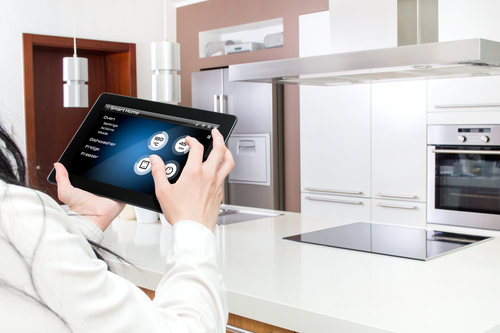The real estate industry is highly competitive, and it’s more important than ever for investors to keep up with the latest trends. Over the last decade or so, the demand for energy efficiency has made upgraded windows, improved insulation and more efficient roofing among the most popular – and profitable – home improvement upgrades. Efficiency is still a popular buzzword, but it’s taken on a decidedly more high-tech flavor in recent years.
Home automation, and other smart home technologies offer greater efficiency and savings on energy costs, tremendous convenience and even enhanced home security. So much so that home buyers have taken notice. Homes that have been outfitted with smart tech often sell more quickly and at a higher price, and savvy investors have a great opportunity to take advantage.
The Value of a Smarter Home
According to recent studies, more than 80 percent of home buyers would opt for a home equipped with smart technology over a comparable home without. Smart homes frequently spend less time on the market, and nearly half of all buyers now specifically seek out homes in which smart products have already been installed. The trends are clear, and they hold true regardless of the buyer’s price range. While high-end buyers have been ahead of the curve when it comes to embracing automation technology, even budget-conscious home buyers are increasingly looking for smarter homes.
A Shifting Market
The demand for smart home technology cuts across virtually all demographic lines, but it can also be leveraged to appeal to specific buyers. Not surprisingly, home automation has been shown to appeal most strongly to Millennials. About half of Millennials already own one or more smart home products, and most tend to look for this technology when comparing properties. A smart security system can be a powerful selling point for families and single parents, who often prioritize security above other considerations. Similarly, energy-saving technologies are often a big hit with eco-conscious buyers, particularly in areas where energy costs typically run high.

In-Demand Automation
It’s not hard to see why prospective buyers have gone crazy over smart homes and different types of smart technologies. Smart thermostats offer energy savings and enhanced comfort at a surprisingly minimal cost. Additionally, these thermostats allow the convenience of adjusting the temperature of a house from the convenience of a smartphone.
Separate smart home technologies can also form the basis of a home security system at a fraction of the cost of traditional security systems. Smart doorbells and security cameras allow homeowners to survey their homes to see who is approaching when they are away or when they simply are in a different room. In addition, smart locks feature hands-free and voice controlled locking and unlocking, notifications from the synced smartphone app telling the user who has been entering or leaving their home, and triggers to lock your doors automatically from other smart home devices such as your home security system.
Even smart light bulbs, sprinklers, HVACs, and other smaller but efficient items can save money while enhancing a homeowner’s experience. Everyone loves convenience, security, and the potential for monthly savings. Many people are willing to pay a premium for a home that can offer those things.

The Cost of Convenience
When it comes to updating a home with automation and smart home technologies, there are a tremendous number of options to get started. Some people opt for a tentative approach, focusing on one specific category at a time. Buying and installing a programmable thermostat may cost less than $100 and take just 30 to 60 minutes. A basic smart security system can be had for $200 to $400 and is similarly simple to install.
On the other hand, it’s also possible to spend tens of thousands of dollars automating virtually every aspect of a home’s operation. This high degree of flexibility makes smart tech all the more appealing, as it can be modified to fit the needs of nearly any homeowner. Adding even a couple smart home technologies can be beneficial when selling your house, since potential homebuyers would be more inclined to look at a home with some of the same features that newly constructed homes may have.
Smart Tech and Security
There’s no question that home automation and smart home products offer great value and are net positives for homeowners, but they’re not without concerns. In particular, the presence of smart products often raises questions about privacy and security. Because they rely on an internet connection to provide certain functions, smart products are potentially vulnerable to hacking and data theft. Fortunately, much of that risk can be mitigated by following some basic security practices. The most important step in securing a smart home is changing the default password for each device, using a unique password for each product. Where applicable, biometric security measures, like voice or fingerprint recognition, are even better.

Smart home technology is still in its relative infancy. The catalog of smart devices have grown rapidly in just the last few years, with internet connectivity and automation working its way into more and more aspects of daily home life. This trend has already unquestionably altered the world of real estate, and it shows no signs of slowing down in the future.
Millennials are, by far, the biggest adopters of smart home technology. The number of Millennials in the home buying market will only expand in the years to come. Savvy real estate investors who are able and willing to jump in early to take advantage of the smart tech movement, stand to benefit greatly as the market slowly adjusts to this new reality.
About the Author
Kate Voss is a writer and blogger based in the Windy City of Chicago. Fueled by coffee and chocolate, she’s an MSU alum with a passion for recycling and refurbishing old furniture. Her favorite Girl Scout Cookie is the trefoil. You can reach Kate at: kate_v@boostalpha.net.























0 Comments